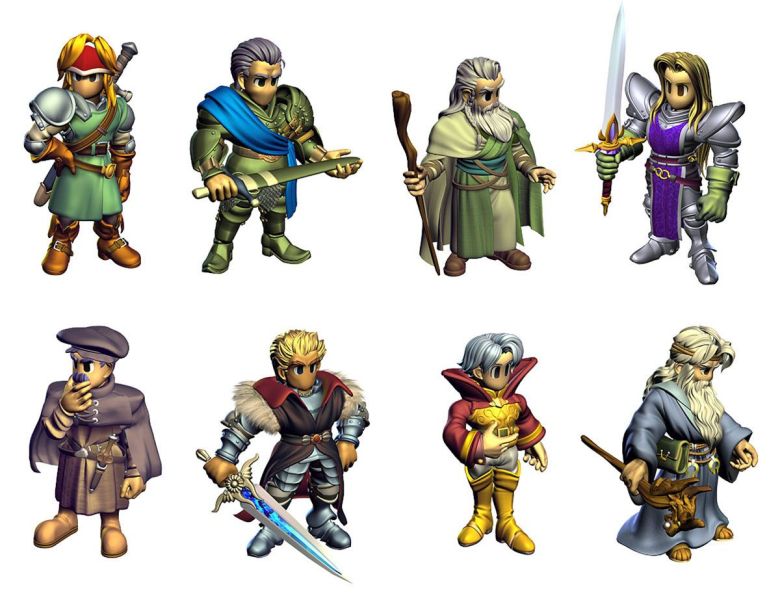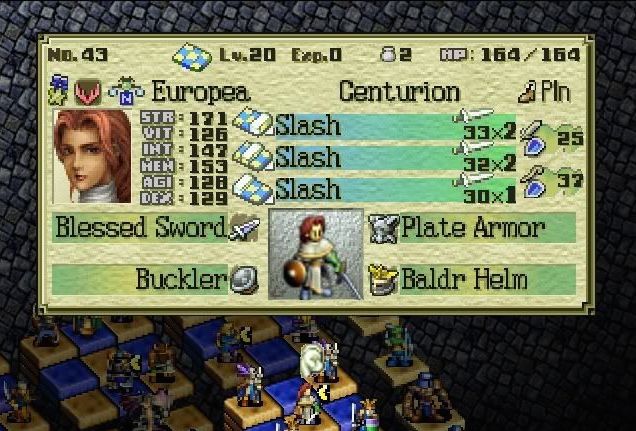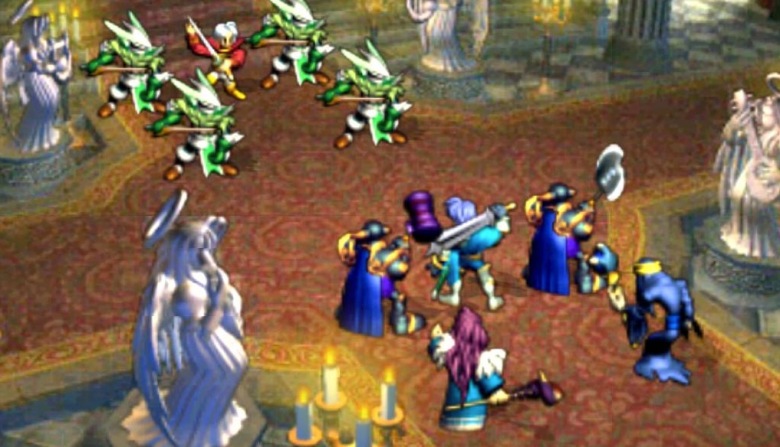
Genre: Tactical RPG
Year: 1999
Developed by: Quest Corporation
Published by: Atlus USA
Platforms: N64
#50
Feeling Like: What’s in a name?
Tactical RPGs and I have a complicated relationship. I tend to balk at diving in, despite many of them littering high spots on the 500, such as Triangle Strategy or Valkyria Chronicles. Hell, Fire Emblem: Three Houses won my Game of the Year for 2019.
I think I get intimidated. These aren’t the kind of games you can just play for a quick session, or learn everything in a tutorial that lasts a few minutes. No, this is the kind of genre that asks something of you. It means putting in the work for learning the combat, understanding how the environment can impact fight results and engrossing yourself in a massive plot supported by a cast of hundreds. It’s not the type of game for a fair weathered fan. But the rewards are correspondingly worthwhile.

Do I have to slap myself upside the head? I’m writing a blog ranking the top 500 games I’ve ever beaten. “Fair weather” is the last phrase I’d use to describe my interest in this hobby. What am I so afraid of? As Succession would say, “Buckle up, fucklehead!”
Maybe it was because I’d never quite played a game like this before. I was in love with RPGs and since the N64 was bereft of them almost entirely, Ogre Battle 64: Person of Lordly Caliber was an easy sell. I was a little confused why I couldn’t just control my units in battle, but I soon realized that’s not the hook of the gameplay. The whole point was preparation and execution, on a grand scale. I wasn’t playing a wizard, or soldier. I was controlling the entire army from above. I was an omnipotent, yet inept, general canvasing the battlefield. I sort of felt like Mr. Burns telling Darryl Strawberry to hit a home run. I TOLD him to do that!

The expansive menus would give some players headaches, but I could spend hours navigating them. Even moving the cursor up and down yielded a pleasant little wood sound. The music is gorgeous, filled with triumphant brass sections and somber, peaceful tunes. It’s one I’ll definitely listen to at any time. That intro song is timeless, there’s a reason most Ogre Battle games re-use it. It’s as much a part of the series’ identity as the crystal theme in Final Fantasy.
I’ve never been so excited to organize my troops. I have a fairly robust imagination, so the ability to completely customize your units into small battalions greatly appealed to me. This meant I could, in my head, picture them all being good friends, who the leader of the pack was, what kind of orders they’d give. Would I stack a single group and have them take out the opposing army single handedly? Or would I try to balance them as much as possible, giving each of my warriors a fair shake. I never got tired of mixing and matching, and experimenting with placements. To boot, you could name every single person in your army. Every. Single. One. And you better believe all my friends, family and school crushes were represented. It made it so easy to form an attachment to my little guys and gals, even if they didn’t have a personality or a place in the plot, per se.

Once the homework was complete, it was off to the combat sections and boy did I get attached to this quickly. It’s a good thing this was released in the summer of 1999; it was the perfect time to get engrossed in a massive RPG for teenage Henry. Unlimited free time, no booze, no job, just figuring out when to move Dobbo’s unit to backup Kasim’s rapidly depleting forces. Or who I should pick to confront the big bad of the map. Setting a course for each of my divisions and then watching the sprites saunter along the map was far more enjoyable than it should be.
The game is loaded with secrets and hidden systems as well. There’s a morality system, which will determine which units you can recruit and, ultimately, which ending you get. There are treasures everywhere and since you have dozens of units at your disposal, hand-me-downs are just as exciting as a fresh sword. Some units will even combine their attacks into a furious magical spell, or some will even allow your units to get in one extra attack. Just because I couldn’t directly micromanage my guys didn’t mean I didn’t feel in control. I always did, and I was always keen to start a new stage of the campaign.

Like the Suikoden series, one of the reasons I love the Ogre Battles are the dedication to including tough subject matter. There aren’t always “good guys” and “bad guys”. Sometimes your protagonists will make a bad choice for good reasons, other times your closest allies may vehemently disagree with you. Betrayals are inevitable, and themes like slavery, loyalty, religion and freedom are portrayed in a manner that exceeds the cartoonish visuals. The graphics haven’t aged all that well – the animations are hardly smooth and you can’t describe the character models as sharp. They’re fuzzy and weird looking, yet the text in the menu is crisp. Strange. Anyway, the story and gameplay are not reliant on high-definition graphics though, by God, I would love an HD remake.
It feels like part of an epic fantasy series. Conflicts feel heavy, and lengthy. Characters go through great arcs, often starting from humble beginnings. There’s never an easy path for our heroes to take, and things that permeate most RPGs like romance or evil demons wanting to take over the world are sparse…though, let’s be honest, they’re definitely in there. It’s still an RPG from Japan, after all.

I warmed up to Tactical RPGs quite quickly, turns out. While I do fall off them occasionally (I don’t think I gave Fire Emblem: Engage a fair chance), the ones I push through and complete usually end up being terrific experiences. I think it’s the grand scope that gets me, and in Ogre Battle 64 you won’t find a bigger game in this regard on the N64. There are dozens of classes to choose from and the possibilities of what your army looks like at the final battle are endless. Combine that with putting nametags on everyone (Hello! My name is Simon the Phalanx), a terrific campaign and that indescribable X-Factor that some games have meant that Ogre Battle 64 was a pleasure to play through then, and a wondrous memory now.
It’s Obviously Outstanding. Onto the Penultimates!